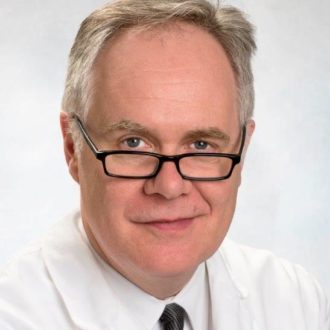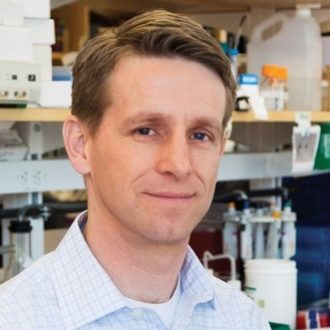
Calum A. MacRae, MD, PhD
Chief of Cardiovascular Division
Brigham and Women’s Hospital
Calum MacRae is a cardiologist, geneticist and developmental biologist who trained in Edinburgh, London and Boston. He is Chief of Cardiovascular Medicine at Brigham and Women’s Hospital and Associate Professor of Medicine at Harvard Medical School. He is also an Associate Member at the Broad Institute and a Principal Faculty Member at the Harvard Stem Cell Institute. His research is focused on understanding the fundamental mechanisms of disease using human studies and complementary efforts combining systems level modeling with empiric high-throughput biology in the zebrafish. His lab uses automated screens in fish to define the genetic architecture of disease and to explore gene-drug (or environment) interactions through the interrogation of large-scale chemical libraries. His clinical interests include general cardiology, genomic medicine, innovation in phenotyping and the redesign of clinical care.

Randall T. Peterson, PhD
Charles and Ann Sanders MGH Research Scholar
Scientific Director, Cardiovascular Research Center
Associate Professor of Medicine, Harvard Medical School
Senior Associate Member, Broad Institute of MIT and Harvard
Randall T. Peterson, PhD is a chemical biologist whose research utilizes high-throughput screening technologies to discover new drug candidates for cardiovascular and nervous system disorders. Unlike conventional drug discovery programs that screen for drug candidates using simplified, in vitro assays, Dr. Peterson’s laboratory screens for drugs using living zebrafish. This approach ensures that the drug candidates discovered are active in the relevant physiological context. Several of the compounds discovered by the laboratory have become widely used research tools or preclinical drug candidates.
Dr. Peterson received his PhD from Harvard University where he studied as a Howard Hughes Medical Institute predoctoral fellow in the laboratory of Stuart Schreiber. As a graduate student, he pioneered the first in vivo high-throughput chemical screens using zebrafish. Following graduation, he completed a postdoctoral fellowship with Mark Fishman at Massachusetts General Hospital. Dr. Peterson is currently the Charles Addison and Elizabeth Ann Sanders Associate Professor at Harvard Medical School, Scientific Director of the MGH Cardiovascular Research Center, and Senior Associate Member of the Broad Institute.

Robert Gerszten, MD, PhD
Chief, Division of Cardiovascular Medicine
Beth Israel Deaconess Medical Center
Herman Dana Professor of Medicine
Harvard Medical School
Robert E. Gerszten, MD serves as Chief of Cardiology at Beth Israel Deaconess Medical Center. He is a Professor of Medicine at Harvard Medical School, and a Senior Associate Member of the Broad Institute. Dr. Gerszten graduated from the University of Virginia as an Echols Scholar and President’s Distinguished Scholar, then entered medical school at the Johns Hopkins University School of Medicine. Following his residency at the University of Pennsylvania, he performed cardiovascular research and clinical fellowships at the Cardiovascular Research Institute at UCSF, and the Cardiovascular Research Center (CVRC), MGH. He joined the MGH as a faculty member in 1997. From 2006-2015 he served as Director of Clinical and Translational Research in the MGH Heart Center.
Dr. Gerszten’s investigative career focuses on the nexus of cardiac and metabolic diseases. His translational research program is a national leader in the use of metabolomics and proteomic technologies for the discovery of new biomarkers and pathways contributing to atherogenesis and its complications. His group has identified novel biomarkers that identify those destined to develop diabetes over a decade before disease onset. An area of particular focus is the application of these tools to identify those most likely to benefit from clinical interventions. His highly interactive program collaborates across a spectrum of institutions, from the Broad Institute to the Framingham Heart Study, the Jackson Heart Study, the Diabetes Prevention Program, and the TIMI Study Group.
His work is funded by the NIH and the American Heart Association, from whom he received an Established Investigator Award. In addition to his investigative focus, Dr. Gerszten has been an active clinician in the Coronary Care Unit and the Consultation Services at MGH, and serves on the Executive Committee of the MGH Cardiac Unit Associates.
Dr. Gerszten is a member of the American Society for Clinical Investigation, the Association of American Physicians, and the Association of University Cardiologists.

Sari B. Mahon, PhD
Assistant Director
Beckman Laser Institute
University of California, Irvine
Sari B. Mahon, Ph. D. is a Project Scientist and Assistant Director of the Beckman Laser Institute, U.C. Irvine. She received her BS and MS in Biology at U.C. Irvine, and Ph.D. in Cell Biology at Baylor College of Medicine. Dr. Mahon worked for Alcon Surgical as Manager of R & D, and in Business Development, leading engineering teams to develop state-of-the-art devices for ophthalmic surgery, and working with physicians, companies and engineers to develop and acquire new surgical products. She returned to academia to pursue research at the Beckman Laser Institute in the laboratory of Matthew Brenner, M.D. Research interests include use of OCT imaging devices for airway cancer, and application of non-invasive optical spectroscopy methods for real-time determinations of tissue physiology in life-threatening scenarios, specifically toxic chemical exposures. Current research focuses on developing new, highly effective, easily administered antidotes for cyanide and H2S exposure.

Matthew Brenner, MD
Professor, Pulmonary and Critical Care Medicine
UC Irvine Medical Center
Matt Brenner is a Professor of Medicine at UC Irvine School of Medicine and the Beckman Laser and Medical Institute, Irvine California. He received BS/BA degrees at U.C. Irvine in Biology and Chemistry, and completed an M.D. at UC San Diego. Following a residency in Internal Medicine at UCSD, he completed fellowship training at both the National Institutes of Health in Critical Care Medicine, and at UC Irvine in Pulmonary Medicine. He served as Chief of Pulmonary and Critical Care Medicine at UC Irvine for 10 years, and is currently Director of the Pulmonary and Critical Care Fellowship training program. His research laboratory investigates novel laser-based optical detection and monitoring of critical illnesses and chemical exposures. These technologies are used for translational diagnosis of metabolic agent exposures and real-time assessment of extent of injury and response to therapy in order to develop chemical agent antidotes.

Gerry Boss, MD
Professor and Vice-Chair for Research, Department of Medicine,
University of California, San Diego.
Gerry Boss is a Professor of Medicine at the UC San Diego School of Medicine. He received a BS degree in Genetics from the University of California, Berkeley, and a M.D. degree from the University of California, Irvine. He completed an Internal Medicine residency at The Johns Hopkins Hospital, and then completed two post-doctoral fellowships, one in a purine metabolism laboratory at the University of California, San Diego and one in a folate/vitamin B12 metabolism laboratory at the Massachusetts General Hospital. Currently at UC San Diego, he is Vice-chair for Research in the Department of Medicine, Director of the Physician-Scientist Training Pathway, and Associate Director of a Masters in Clinical Research. He is actively working on developing new cyanide and hydrogen sulfide antidotes.
